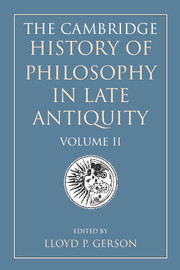Book contents
- Frontmatter
- VI Late Platonism
- VII The third encounter of Christianity with ancient Greek philosophy
- Introduction to Part VII
- 42 Pseudo-Dionysius the Areopagite
- 43 Boethius
- 44 Maximus the Confessor
- 45 John Scotus Eriugena
- VIII Philosophy in transition
- Appendix: List of works of ancient authors
- List of abbreviations
- Bibliography
- Index locorum
- General index
- References
43 - Boethius
from VII - The third encounter of Christianity with ancient Greek philosophy
Published online by Cambridge University Press: 28 May 2011
- Frontmatter
- VI Late Platonism
- VII The third encounter of Christianity with ancient Greek philosophy
- Introduction to Part VII
- 42 Pseudo-Dionysius the Areopagite
- 43 Boethius
- 44 Maximus the Confessor
- 45 John Scotus Eriugena
- VIII Philosophy in transition
- Appendix: List of works of ancient authors
- List of abbreviations
- Bibliography
- Index locorum
- General index
- References
Summary
LIFE AND WORKS
Anicius Manlius Severinus Boethius was descended from an established Roman elite. His date of birth is unknown but must have been c. 480, perhaps as early as 475. His father, (? Narius) Manlius Boethius (cos. 487), came from a line that may have had its origins in the East, while his maternal lineage too went back to the Gens Anicia, which had converted to Christianity in the fourth century. Boethius himself was named Consul in 510, the Consulship being one of only two securely datable facts concerning his public life. He evidently lost his parents, or his father, when still young and was adopted by Q. Aurelius Memmius Symmachus (cos. 485), a descendant of Q. Aurelius Symmachus (cos. 391). Although the details of Boethius’ education remain obscure, we may be certain that Symmachus had a controlling hand in shaping it. At Variae 1.45.3 Cassiodorus mentions Boethius’ having ‘entered far away the school of the Athenians’ (Atheniensium scholas longe positus introisti), which, as Courcelle observed, probably indicates only that Boethius intellectually ‘enrolled’ in the school despite the distance from Athens. Courcelle alternatively proposed that Boethius studied under Ammonius in Alexandria, but his thesis is seriously undermined by the texts he adduced in support of it. Boethius’ commentaries are not mere copies of Ammonius’, and even if they were, to demonstrate that Boethius actually studied in Alexandria would be an entirely different matter.
- Type
- Chapter
- Information
- The Cambridge History of Philosophy in Late Antiquity , pp. 788 - 812Publisher: Cambridge University PressPrint publication year: 2000
References
- 1
- Cited by



